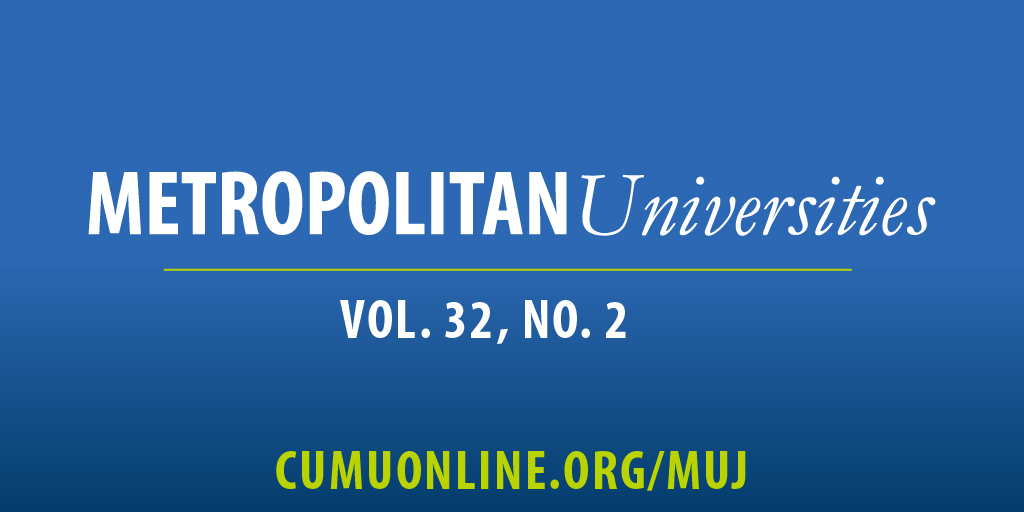Third Space Creates Collaborative Environments to Develop Pre-service Teachers
DOI:
https://doi.org/10.18060/24927Keywords:
Third Space, teacher preparation, field-based experience, clincial practiceAbstract
In the fall of 2012, 11% (n=157) of clinical practice (i.e. student teaching) candidates at a metropolitan university were in jeopardy of not passing clinical practice. Public schools in the area began to voice their concerns, and placements of candidates became a challenge. As a result, the university re-envisioned the program, utilizing third space to facilitate discourse between local school districts and university faculty. The development of third space was based on program data, which led to the following shifts in the program: scaffolded coursework with increased time in the field; instructional coaching prior to clinical practice; and a system for collecting feedback to sustain partnerships. Collaboration between P-12 schools and the university was essential in preparing candidates to connect theory and apply it in practice. By spring 2016, the initiatives implemented led to a 12% decrease of candidates in jeopardy of not passing clinical practice. As the teacher preparation program continues to grow, one of the biggest challenges is continuing to build and sustain new partnerships. The authors provide a framework for how programs could adapt some of these initiatives to develop and sustain university and school partnerships.
References
American Association of Colleges for Teacher Education. (2018). A pivot toward clinical practice, its lexicon, and the renewal of educator preparation. https://aacte.org/resources/research-reports-and-briefs/clinical-practice-commission-report/
Abbott, C. J., & McKnight, K. (2010). Developing instructional leadership through collaborative learning. AASA Journal of Scholarship & Practice, 7(2), 20-26. http://search.proquest.com/docview/757171257?accountid=14692
Beck, J. S. (2020). Investigating the third space: A new agenda for teacher education research. Journal of Teacher Education, 71(4), 379-391. https://doi.org/10.1177/0022487118787497
Boyd, D. J., Grossman, P. L., Lankford, H., Loeb, S., & Wyckoff, J. (2009). Teacher preparation and student achievement. Educational Evaluation and Policy Analysis, 31(4), 416–440. https://doi.org/10.3386/w14314
Braaten, M. (2019). Persistence of the two-worlds pitfall: Learning to teach within and across settings. Science Education, 103(1), 61-91. https://doi.org/10.1002/sce.21460
Costa, A.L., & Garmston, R.J. (2015). Cognitive coaching: Developing self-direction leaders and learners (3rd ed.). Rowman and Littlefield.
Clarke, D., & Winslade, M. (2019). A school-university teacher education partnership: Reconceptualising reciprocity of learning. Journal of Teaching and Learning for Graduate Employability, 10(1), 138–156. https://doi.org/10.21153/jtlge2019vol10no1art79
Darling-Hammond, L., Hammerness, K., Grossman, P., Rust, F., & Shulman, L. (2005). The design of teacher education programs. In L. Darling-Hammond & J. Bransford (Eds.), Preparing teachers for a changing world (pp. 390-441). Jossey Bass.
Darling-Hammond, L. (2010). Teacher education and the American future. Journal of Teacher Education, 61(1-2), 35–47. https://doi.org/10.1177/0022487109348024
DeAngelis, K., Wall, A., & Che, J. (2013). The Impact of Preservice Preparation and Early Career Support on Novice Teachers’ Career Intentions and Decisions. Journal of Teacher Education, 64(4), 338–355. https://doi.org/10.1177/0022487113488945
DeLuca, C. C. (2012). Preparing teachers for the age of accountability: Toward a framework for assessment education. Action In Teacher Education, 34(5-6), 576-591. https://doi.org/10.1080/01626620.2012.730347
Feiman-Nemser, S. (2001). From Preparation to Practice: Designing a continuum to strengthen and sustain teaching. Teachers College Record, 103(6), 1013-55. https://doi.org/10.1111/0161-4681.00141
Feiman-Nemser, S., & Buchmann, M. (1985). Pitfalls of experience in teacher preparation. Teachers College Record, 87, 255–273.
Goodlad, J. I. (1993). School-university partnerships and partner schools. Educational Policy, 7(1), 24. https://doi.org/10.1177/0895904893007001003
Hammerness K. & Kennedy, B. (2019). Teaching practices grounded in foundational knowledge, visions, and contexts. The New Educator, 15(1), 66-83. https://doi.org/10.1080/1547688X.2018.1506070
Hollins, E. (2011). Teacher preparation for quality teaching. Journal of Teacher Education, 62(4),395-407.
Klein, E., Taylor, M., Onore, C., Strom, K.,& Abrams, L. (2013). Finding a third space in teacher education: Creating an urban teacher residency. Teaching Education, 24(1), 27–57. https://doi.org/10.1080/10476210.2012.711305
Knight, J. (2007). Instructional coaching; A partnership approach to improving instruction. Corwin Press.
Lawley, J.I., Moore, J., & Smajic, A. (2014). Effective communication between preservice and mentor teachers. The New Educator, 10, 153-162. https://doi.org/10.1080/1547688x.2014.898495
Lee, R. E. (2018). Breaking down barriers and building bridges: Transformative practices in community- and school-based urban teacher preparation. Journal of Teacher Education, 69(2), 118-126. https://doi.org/10.1177/0022487117751127
Moore, L., & Sampson, M. B. (2008). Field-based teacher preparation: An organizational analysis of enabling conditions. Education, 129(1), 3–16.
National Council for Accreditation of Teacher Education [NCATE]. (2010). Transforming teacher education through clinical practice: A national strategy to prepare effective teachers. https://eric.ed.gov/?id=ED512807
National Commission on Teaching and America’s Future. (1996). What matters most: Teaching for America’s future. Report of the National Commission on Teaching & America’s Future. National Commission on Teaching and America’s Future.
Orland-Barak, L. & Wang, J. (2020). Teacher mentoring in service of preservice teachers’ learning to teach: Conceptual bases, characteristics, and challenges for teacher education reform. Journal of Teacher Education, 72(1), 86-99. https://doi.org/10.1177/0022487119894230
Ronfeldt, M., Brockman, S. L., & Campbell, S. L. (2018). Does cooperating teachers’ instructional effectiveness improve preservice teachers’ future performance? Educational Researcher, 47(7), 405-418. https://doi.org/10.3102/0013189X18782906
Ronfeldt, M., Owens Farmer, S., McQueen, K., & Grissom, J. A. (2015). Teacher collaboration in instructional teams and student achievement. American Educational Research Journal, 52(3), 475-514.
Sailors, M., & Hoffman, J.V. (2019). Mentoring in transformative hybrid spaces: Preservice teacher preparation and literacy learning in Mocambique. Journal of Adolescent & Adult Literacy, 63(2), 127-133. https://doi.org/10.1002/jaal.972
Torrez, C. A. F., & Krebs, M. M. (2012). Expert voices: what cooperating teachers and teacher candidates say about quality student teaching placements and experiences. Action in Teacher Education, 34(5-6), 485–499. https://doi.org/10.1002/jaal.972
Wilcoxen, C., Proctor, J., Steiner, A., & Lemke, J. (2015). Collaborating with University Faculty and District Partners to Provide Meaningful Field Experiences for Pre-service Teachers. The Field Experience Journal. 15 Fall, 111.
Zeichner, K. (2010). Rethinking the connections between campus courses and field experiences in college- and university-based teacher education. Journal of Teacher Education, 61(1-2), 89-99. https://doi.org/10.1177/0022487109347671
Zeichner, K. (2012). The turn once again toward practice-based teacher education. Journal of Teacher Education, 63(5), 376-382. https://doi.org/10.1177/0022487112445789
Downloads
Published
Issue
Section
License
Copyright (c) 2021 Amanda Steiner, Chris Wilcoxen, Julie Bell

This work is licensed under a Creative Commons Attribution 4.0 International License.



